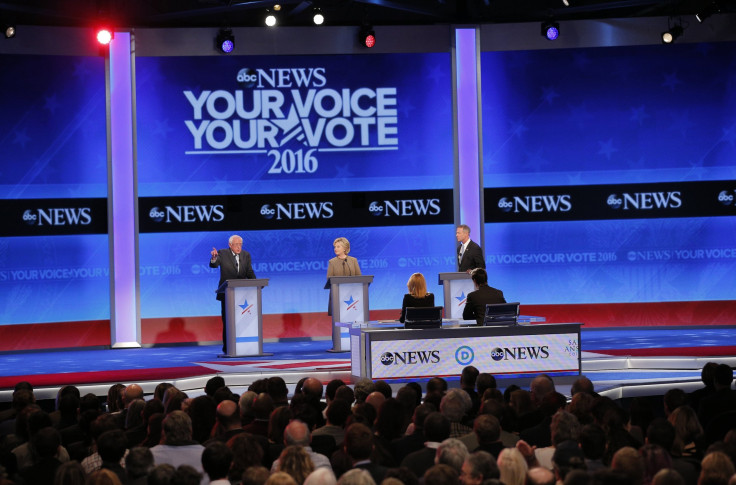Republicans React To ABC Democratic Debate: What Are GOP Candidates Saying On Twitter As Democrats Spar Over Policy?

Saturday night's debate was a chance for the 2016 Democratic presidential candidates — former Secretary of State Hillary Clinton, Vermont Sen. Bernie Sanders and former Maryland Gov. Martin O'Malley — to have their voices and opinions heard. Naturally, some Republican candidates wanted in on the discussion, as well.
Republicans took to Twitter to voice their reactions, and as some picked on Clinton's policy toward defeating the Islamic State group, others took aim at the Democratic trio's discussion on taxes, with some going for snarky jokes. The usually outspoken Donald Trump, the front-runner on the GOP side, stayed uncharacteristically quiet on social media.
Former Florida Gov. Jeb Bush was the most active, criticizing Clinton on Twitter for saying the U.S. is now where it needs to be in the fight against ISIS. He also criticized the link she made to conflate gun control and defeating terrorism.
Nothing like listening to 3 democrats argue about who is going to raise taxes the most. #DemDebate
— Jeb Bush (@JebBush) December 20, 2015
No @HillaryClinton - We are not "where we need to be" in fight against ISIS. #DemDebate
https://t.co/PFPpF5lADy
— Jeb Bush (@JebBush) December 20, 2015
They've said ISIS is not our fight. #DemDebate pic.twitter.com/lJ6ee2TAgR
— Jeb Bush (@JebBush) December 20, 2015
More gun control isn't the answer to defeating radical Islamic terrorism, @HillaryClinton. #DemDebate
https://t.co/6TLbmtfWBy
— Jeb Bush (@JebBush) December 20, 2015
Texas Sen. Ted Cruz took aim at Obamacare, saying it needed a full repeal.
Obamacare's problems aren't a "glitch". Obamacare's problem is it is a failure. We need a #FullRepeal: https://t.co/2UGqI3KhaN #DemDebate
— Ted Cruz (@tedcruz) December 20, 2015
Kentucky Sen. Rand Paul took a swipe at Clinton, but said he was skipping out on watching the debate.
By not watching the #DemDebate, I missed @HillaryClinton talking about Liberty. Reminds me of @tedcruz fav movie pic.twitter.com/3MWzod9ag9
— Dr. Rand Paul (@RandPaul) December 20, 2015
And former Arkansas Gov. Mike Huckabee criticized Democrats for their concern over Sanders staff accessing Clinton's campaign's voter data, implying that the candidates were ignoring more pressing issues.
Why are @TheDemocrats more upset about @BernieSanders having access to @HillaryClinton's computer system than Russia/China/Iran? #DemDebate
— Gov. Mike Huckabee (@GovMikeHuckabee) December 20, 2015
Clinton has maintained a steady lead since announcing for the 2016 presidential race. A recent Monmouth University poll found that Clinton polled at 59 percent support, whereas her closest challenger, Sanders, was favored by 26 percent of likely Democratic voters. O'Malley held just 4 percent support in the polls. The debate was the third Democratic presidential debate, and was hosted by ABC News and St. Anselm College in Manchester, New Hampshire.
The debate focused largely on national security and foreign policy. Clinton was asked tough questions about her support for intervention in Libya, which has now become a haven for terrorist groups like ISIS and al Qaeda. Many criticized her assertion that the U.S. is now effectively combating ISIS, given that the group has recently carried out a series of attacks overseas.
© Copyright IBTimes 2025. All rights reserved.






















